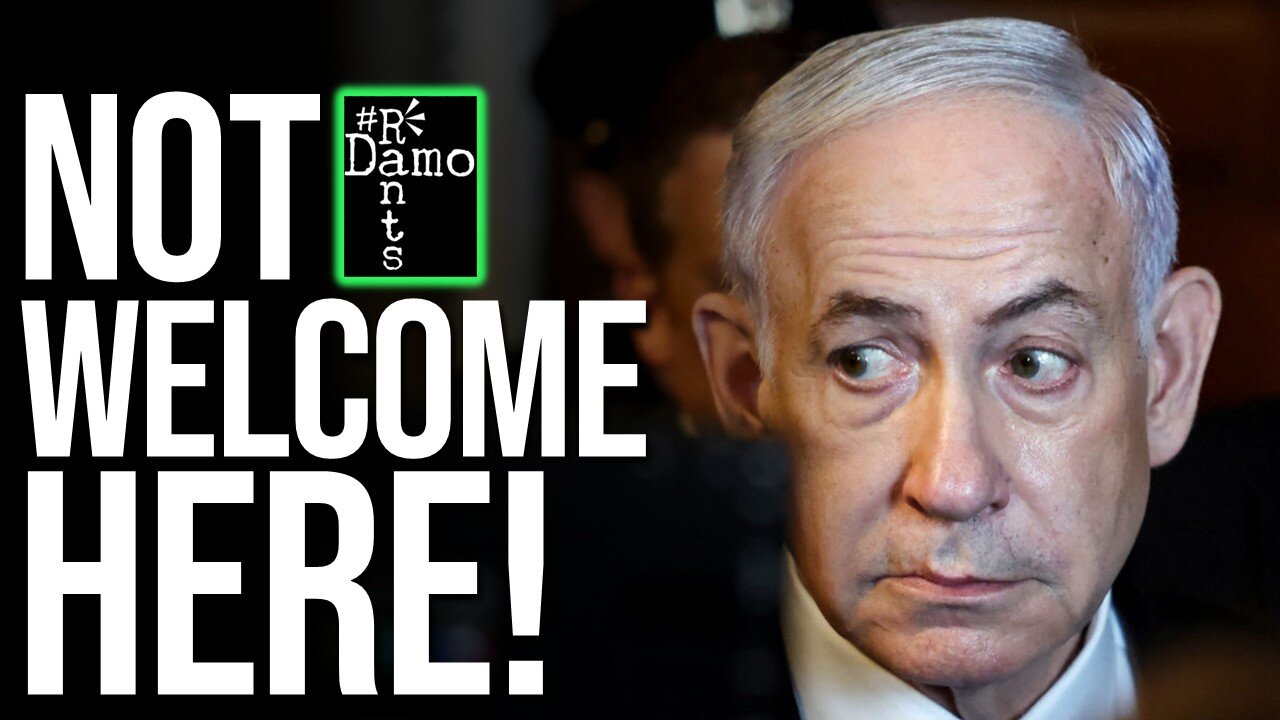Premium Only Content

Belgium Blocks Israel at the Border – And the Fallout Explodes
Right, so it turns out you don’t need a seat in parliament to make foreign policy — sometimes all it takes is a high-vis vest, a union card, and the nerve to tell a national airline to get stuffed. While Belgium’s political class clinks glasses with diplomats and perfects the art of “expressing concern” over Gaza, its baggage handlers and dockers are quietly rewriting the country’s relationship with Israel from the ground up. They don’t draft communiqués; they draft in volunteers — if they can find any — to work the Tel Aviv runs. They don’t issue sanctions; they issue refusals, one shipment at a time. And when they move, it’s not in the plodding, committee-bound way of ministers, but with the kind of immediacy that strands an El Al jet on the tarmac or leaves a cruise liner idling offshore. In Belgium, the high-vis brigade has become the country’s most effective foreign policy department — and it didn’t even have to stand for election.
Right, so the events that unfolded at Brussels Airport the other day would have been unthinkable a few years ago, and they reveal something fundamental about where the real moral leadership in Belgium — and perhaps Europe more broadly as we see more and more ordinary working class people in more and more countries — now lies. Just yesterday, four separate unions representing ground-handling staff — Alyzia, Pulse, CNE, and ACV-CSC Transcom — declared that they would not be compelled to work on flights to or from Israel or Israeli-occupied territories. The unions made no attempt to cloak their reasoning in bland language. As reported by Press TV, they described the war in Gaza as an ongoing genocide, invoked international law, and insisted that to handle baggage, freight, or passengers for Israeli carriers such as El Al would be to become complicit in war crimes. It was a calculated act of moral refusal.
The outcome was immediate. Brussels Airlines, the Belgian flag carrier, confirmed that it would operate its Tel Aviv flights only if enough staff volunteered to service them. There would be no forced assignments, no quiet penalisation of workers who opted out. This was not the complete suspension of services that activists might dream of, but it was a tangible concession. It created a structural vulnerability in the airline’s operations: if the volunteer pool dried up, flights could be delayed or cancelled without any formal strike call. And the timing made the gesture even more potent. Just days earlier, a Belgian court had ruled that the Flemish government must halt the transit of military equipment to Israel through the Port of Antwerp, imposing a fine of €50,000 for each violation. That injunction, reported by Euronews on 7 August, followed the discovery of containers carrying components for Israeli tanks — the latest fruit of months of union vigilance and NGO whistleblowing.
To grasp the significance of these two events — the airport refusal and the Antwerp court order — we need to understand the broader Belgian and European context. The airport action did not spring from nowhere, it has been a narrative that has long been observed in Belgium, just lacking the media oversight. All the way back in October 2023, with Gaza already under siege, Belgian port unions including ACV Puls, BTB, BBTK, and ACV-Transcom had announced they would refuse to handle arms shipments bound for Israel. As Reuters documented at the time, the unions framed their refusal as a moral imperative: they would not be the ones to load the crates of rifles, ammunition, or vehicle parts that would be used to sustain a military campaign they considered criminal. This early stand placed Belgium within a growing pattern of transport-sector solidarity actions across Europe.
By June of this year therefore, that pattern was well established. Labor Notes chronicled a continent-wide network of dockers, many operating with quiet support from activist organisations, who were tracking military cargo and blocking it when possible. The magazine described the European dockworkers’ refusals as coordinated acts of resistance, informed by intelligence-sharing and driven by a shared sense of responsibility. In Belgium, this transnational network was instrumental in uncovering the Antwerp shipment that led to the August court ruling. Without such cooperation, those tank-parts containers might have slipped through unnoticed, and the Flemish government would have been spared the embarrassment — and legal compulsion — of the injunction.
So there is a symbolic dimension to all of this that is hard to overstate. Airports and ports are the literal gateways of a country’s engagement with the wider world. They are where the abstract lines of foreign policy become concrete — where a political choice to trade with, arm, or welcome a particular state turns into a physical movement of goods and people. When workers at those choke points say “no,” they do not merely delay a shipment or a flight; they disrupt the performance of normality that international commerce and travel depend on. It is one thing for a government to issue a diplomatic protest; it is another for an El Al plane to sit idle at the gate because no one will load its baggage.
The Brussels action is particularly striking because it targeted a service that is not, on the face of it, military at all. Handling a passenger flight is very different from loading crates of ammunition. The unions’ refusal in this case was not about intercepting weapons; it was about denying Israel the appearance of being a normal, uncontroversial partner in peacetime aviation while it was prosecuting a brutal war. That is a significant shift — from opposing the tools of war to opposing the normality of international connection — and so it marks a deepening of the strategy. It is the same logic that guided the shipyard workers of Syros in Greece, as I covered the other day, when they refused to service the Crown Iris, an Israeli-owned cruise ship. As AP News reported, those workers argued that to overhaul or refit such a vessel was to facilitate “normalisation tourism” — allowing Israeli holidaymakers to bask in Mediterranean leisure while their government was levelling Gaza.
Both the Syros and Brussels refusals are instances of what might be called “normality blockades.” They are not about preventing the direct flow of arms; they are about disrupting the web of civilian-facing services — leisure cruises, commercial flights — that help a state maintain the appearance of belonging comfortably to the family of nations, it cuts through the propaganda and ensures ordinary Israelis do not escape the consequences of their government’s actions. And both of these examples, notably, were carried out in ways that reduced legal exposure for the unions involved. In Brussels, there was no physical picket line, no all-out strike that could be deemed illegal under Belgian law’s essential services provisions. Instead, the unions won the right for members to opt out individually, forcing management to scramble for volunteers. In Syros, the refusal was rooted in workplace autonomy over what contracts the shipyard would accept, rather than in a formal strike.
For El Al, Israel’s national airline, the trouble in Brussels is only the latest in a string of European headaches. In early August, its Paris office was vandalised with red paint and the words “EL AL genocide airline,” as Reuters reported. Around the same time, Ynet News revealed that Alyzia — the French ground-handling firm that also operates in Brussels — had told its staff they could refuse to handle El Al flights. The Times of Israel added another blow: the French authorities had stopped renewing work visas for El Al’s security personnel in Paris, forcing the airline to reshuffle its staffing. And in June 2024, an El Al flight diverted to Antalya, Turkey, for a medical emergency found itself unable to refuel because local airport workers refused service; it had to fly on to Rhodes to take on fuel, according to One Mile at a Time. For a national carrier, such incidents are not just operational nuisances. They undermine the airline’s ability to project an image of untroubled international integration — in much the same way that boycotts of South African Airways during apartheid became a proxy for condemning the Pretoria regime. This can be seen therefore as another form of BDS in a sense.
Against this backdrop, Belgium’s official stance on Israel appears conflicted though. There have been undeniably strong symbolic gestures. King Philippe’s declaration in July that the humanitarian crisis in Gaza was “a disgrace to humanity” was unusually direct for a constitutional monarch. The government’s support for an EU proposal to suspend Israel from sensitive areas of the Horizon Europe research programme, signalled at least some willingness to apply economic pressure. And the high-profile arrests at the Tomorrowland music festival in late July, when Belgian police detained two Israeli nationals under the country’s universal jurisdiction war-crimes law, showed that the legal system could, in certain circumstances, be used to hold individuals to account.
Yet these gestures have not translated into a comprehensive policy shift. MPs were recalled from their summer recess for an emergency debate on Gaza, but no major change in foreign policy emerged. Calls to end Flemish trade support for Israeli ventures, have yet to produce binding restrictions. And Belgium’s humanitarian visa process for Gazans remains so complicated that many applicants are effectively shut out still. In short, while unions and courts have taken concrete steps that materially affect Belgium’s dealings with Israel, the federal government has remained cautious, balancing moral rhetoric with the maintenance of formal ties still, it’s a split between governance on one hand and people powered action, often via the trade union movement on the other that exposes the hypocrisy.
The question of why unions are able to move faster than governments has both structural and political answers though. Governments are enmeshed in alliances, trade agreements, and as far as European nations go, often requiring the need for EU consensus. They must weigh each action against its potential to disrupt a wide range of interests. That said, we’re talking about genocide here and how important those ties are in light of that, nevertheless becomes to say the least very questionable. Unions, by contrast, are accountable primarily to their members, ordinary working class people. They can decide collectively that they will not handle a certain shipment or service and then act on that decision. In sectors like transport, where the labour is itself the choke point — the dock crane operator, the baggage loader — the withdrawal of cooperation can halt an operation entirely. European dockers have developed cross-border networks to share intelligence about shipments, enabling them to act in concert without waiting for political authorisation and we’ve certainly seen that play out between Unions across mediterranean states.
The methods vary. The “hard blockade” seen in ports like Genoa or Marseille involves outright refusal to move cargo, sometimes backed by pickets that make crossing both politically costly and physically difficult. The “soft blockade” used at Brussels Airport is more legally cautious: it relies on individual opt-outs to create staff shortages, slowing or halting operations without triggering the legal penalties of more vociferous action might cause. In aviation, where essential service laws are stricter, the soft blockade offers a way to maintain both moral clarity and legal cover.
Historically, such tactics have been powerful precursors to governmental change. In the 1970s and 1980s, dockworkers in the UK, US, Australia, and New Zealand refused to handle South African goods, years before their governments imposed formal sanctions. During the Vietnam War, longshoremen in Oakland and Sydney blocked military shipments. After the 1973 coup in Chile, European and Australian dockers refused to load or unload Chilean cargo, protesting the junta’s repression. In each case, the workers’ actions imposed practical costs and signalled moral positions that political leaders would eventually be forced to reckon with.
The immediate consequences of the Brussels Airport action are clear enough. Tel Aviv flights now depend on the willingness of volunteers, creating the possibility of delays, cancellations, and public attention each time a flight is disrupted. Politically, the action highlights the gap between a government that maintains normal air links and a workforce willing to impede them. Diplomatically, it adds to the growing list of irritants in EU–Israel relations, joining the Antwerp arms-transit ban, the Tomorrowland arrests, and the Horizon Europe partial suspension.
The deeper question is whether this model can scale up. In theory, the volunteer-only approach could easily be adopted at other European airports, especially where unions are strong and where public opinion supports Palestinian solidarity. In the maritime sector, the hard blockade will remain the most potent tactic against arms shipments, but its logic could be extended to civilian goods or services deemed to normalise relations with Israel, for example the cruise ship to Syros. The key will be coordination: the same intelligence-sharing networks that track weapons could be used to identify and target other forms of Israeli-linked commerce as well.
For Belgium, the choice is quite plain. It can continue on its current dual track, allowing unions and courts to constrain aspects of the relationship with Israel while leaving official policy largely intact, or it can align state action with the moral stance of its workers. The Tomorrowland arrests proved that decisive enforcement of international law is possible; the question is whether such enforcement will remain episodic, dependent on particular circumstances, or become a consistent element of foreign policy.
What happened at Brussels Airport is thus about much more than a single day’s disruption. It is a case study in the latent power of the working class to shape international relations from below. It demonstrates that when governments hesitate, ordinary people — through their unions — can enforce a moral line, using their control over critical points in the economy to make their stance felt. The parallels to Syros, to the Mediterranean ports, to El Al’s mounting operational problems across Europe, and to historical movements from anti-apartheid to anti-war, all point in the same direction. This is not a one-off protest; it is part of a tried and tested tradition in which workers act first and governments, eventually, follow.
Whether Belgium’s political class will catch up remains to be seen. But for now, the image of an El Al plane at Brussels Airport, waiting for volunteers to load its baggage, does stand as a pretty potent symbol. It is a reminder that sometimes the path to justice does not run through the corridors of power at all, but through the tarmacs, docks, and shop floors where ordinary people, faced with a moral choice, decide they will not be complicit.
That pressure on Belgium’s governance is already coming though, more pressure being heaped upon them, as now less than 21 of their own diplomats have come out swinging against Israel now as well, hardly a diplomatic act you might think, but this is genocide, there is no place frankly for niceties is there? So get all the details of that story in this video recommendation here as your suggested next watch.
Please do also hit like, share and subscribe if you haven’t done so already so as to ensure you don’t miss out on all new daily content as well as spreading the word and helping to support the channel at the same time which is very much appreciated, holding power to account for ordinary working class people and I will hopefully catch you on the next vid. Cheers folks.
-
 LIVE
LIVE
SavageJayGatsby
21 hours ago🔥🥃 Spicy Saturday – 🥃🔥
45 watching -
 LIVE
LIVE
FusedAegisTV
9 hours agoFUSEDAEGIS | Generational Video Game?? | Expedition 33 PART I
2,727 watching -
 23:31
23:31
MYLUNCHBREAK CHANNEL PAGE
1 day agoNo Blueprints - Pt 1
48.1K26 -
 LIVE
LIVE
Major League Fishing
2 days agoLIVE! MLF Toyota Series Championship!
2,055 watching -
 4:38:52
4:38:52
DHG
7 hours agoRE4R - BIORAND X3 ENEMY MULTIPLIER MOD - PROFESSIONAL
20.3K -
 30:14
30:14
Robbi On The Record
1 day ago $5.33 earnedYou’re Out of Alignment: Spiritually, Mentally, Physically. Here’s Why. ft Dr. Rich
33.1K2 -
 4:27:17
4:27:17
LadyDesireeMusic
8 hours ago $2.40 earnedDaily White Pill- Music & Chat
22.2K7 -
 1:33:25
1:33:25
Jeff Ahern
6 hours ago $6.88 earnedThe Saturday Show with Jeff Ahern
35.6K7 -
 LIVE
LIVE
Spartan
5 hours agoStellar Blade Hard Mode with death counter (First Playthrough)
44 watching -
 LIVE
LIVE
GrimmHollywood
6 hours ago🔴LIVE • GRIMM HOLLYWOOD • SGT WILKY'S WARZONE PALOOZA 2 •
85 watching